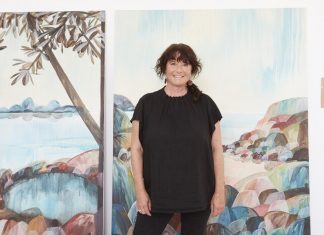Andrew Mathieson
NOVELIST Dorothy Johnston wouldn’t dare spew out a chestnut of a line in one of her seven books to date.
But 27 years on since moving to Canberra, she would have to admit that you can take the girl out of Geelong but you can’t take Geelong out of the girl.
Dorothy was born in Geelong in 1948, and lived her first three years at the Geelong West end of Autumn Street before growing up in Belmont’s High Street.
She describes herself as a “bit of a loner” early on, spending much of her spare time down at the Barwon River.
It was a different place then to now.
“When I was a child, the part of Geelong where I grew up, along the Barwon River, none of that had been developed,” she reminisces.
“I remember my childhood there being a very free one, roaming and exploring; it was like having a huge kind of wilderness area.
“I think some of the experiences you have as a child do influence you.”
Dorothy’s fourth novel, One for the Master, was inspired by the life and demise of the Highlands Woollen Mills on the banks of the river.
The insightful narrative is written in the first person through the eyes of a young female worker.
The novel was short-listed for the prized 1998 Miles Franklin Award and has since been put on the VCE English syllabus.
Dorothy’s experiences growing up in Geelong, however, were far from perfect.
She wanted out and sought the bright city lights.
“I have to say, it was a fairly depressed city back then,” Dorothy recalls.
“Geelong went through that phase of its old industries collapsing and that started to happen in the ’60s.
“But I just want to say with hindsight, I think those perceptions were just the perceptions of a naive 17-year-old – they weren’t realistic at all.”
Dorothy plans to return to Geelong in retirement, describing the city’s transformation as “wonderful”.
Her mother, Ivy Johnston, still lives at Point Lonsdale and is a former writer whose humble upbringing on a farm influenced Dorothy’s own writing.
But it was all in contrast to Dorothy’s 1988 book, Maralinga My Love, about British bomb testing in the 1950s – or so she thought.
“When I was writing that I discovered the main character had a lot in common with my father and that was sort of the emotional drive to put the character in that situation,” Dorothy explains.
“I didn’t realise that until I was halfway through the book that sort of thing has happened repeatedly.”
At Melbourne University Dorothy studied history, French and also English – only the classics, not creative writing.
It was not until she became unhappy following a “hopeless love affair” that she decided to dabble in novels.
“I didn’t have particular aspirations to be world famous or rich or anything like that because you might as well hope to win the lottery,” she scoffs.
Dorothy has also earned a meal ticket from reviewing books, teaching classes and running book groups at the ACT Public Library.
She used to get up at five in the morning every day to write before going to work.
“It’s very difficult because, unless you’re very lucky, it doesn’t make you any money,” Dorothy says.
Nowadays she focuses on the third of a four-part detective series exploiting the mystique of Canberra.
But Dorothy rules out her own memoirs about Geelong.
“The reason I couldn’t write a biography is that I can’t stick to the truth,” she laughs.
“Even in an essay when I’m setting up something I start making stuff up.”







